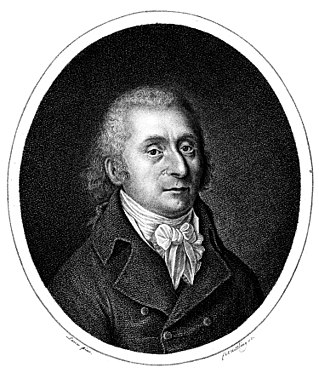Related Research Articles

Johann Wenzel Anton Stamitz was a Bohemian composer and violinist. His two surviving sons, Carl and Anton Stamitz, were composers of the Mannheim school, of which Johann is considered the founding father. His music is stylistically transitional between the Baroque and Classical periods.

Carl Ditters von Dittersdorf was an Austrian composer, violinist, and silvologist. He was a friend of both Haydn and Mozart. His best-known works include the German Singspiele Doktor und Apotheker and a number of programmatic symphonies based on Ovid's Metamorphoses.

Franz Anton Hoffmeister was an Austrian composer and music publisher.

Johann Wilhelm Wilms was a Dutch-German composer, best known for setting the poem Wien Neêrlands Bloed to music, which served as the Dutch national anthem from 1815 to 1932.

Johann Baptist Wanhal was a Czech classical music composer. He was born in Nechanice, Bohemia, and died in Vienna. His music was well respected by Mozart, Haydn, Beethoven and Schubert. He was an instrumental performer as well. While being a proficient organist, he also played the violin and cello.
G minor is a minor scale based on G, consisting of the pitches G, A, B♭, C, D, E♭, and F. Its key signature has two flats. Its relative major is B-flat major and its parallel major is G major.
Sturm und Drang was a proto-Romantic movement in German literature and music that occurred between the late 1760s and early 1780s. Within the movement, individual subjectivity and, in particular, extremes of emotion were given free expression in reaction to the perceived constraints of rationalism imposed by the Enlightenment and associated aesthetic movements. The period is named after Friedrich Maximilian Klinger's play of the same name, which was first performed by Abel Seyler's famed theatrical company in 1777.

G minor has been considered the key through which Wolfgang Amadeus Mozart best expressed sadness and tragedy, and many of his minor key works are in G minor. Though Mozart touched on various minor keys in his symphonies, G minor is the only minor key he used as a main key for his numbered symphonies.
References
- ↑ Paul Bryan, Johann Waṅhal, Viennese Symphonist: His Life and His Musical Environment Stuyvesant: Pendragon Press (1997): 330. The manuscript copy at Donaueschingen gives the key as "
A" while the one at Prague gives it as "Gis" (G sharp).